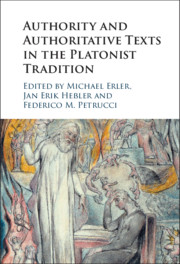Book contents
- Authority and Authoritative Texts in the Platonist Tradition
- Authority and Authoritative Texts in the Platonist Tradition
- Copyright page
- Contents
- Figures
- Contributors
- Acknowledgements
- Abbreviations
- Introduction
- Chapter 1 Xenocrates’ Invention of Platonism
- Chapter 2 An Iconography of Xenocrates’ Platonism
- Chapter 3 Arcesilaus’ Appeal to Heraclitus as a Philosophical Authority for His Sceptical Stance
- Chapter 4 Authority beyond Doctrines in the First Century bc
- Chapter 5 Authority and Doctrine in the Pseudo-Pythagorean Writings
- Chapter 6 Constructing Authority
- Chapter 7 Plutarch’s E at Delphi
- Chapter 8 Aristotle’s Physics as an Authoritative Work in Early Neoplatonism
- Chapter 9 Conflicting Authorities? Hermias and Simplicius on the Self-Moving Soul
- Chapter 10 Kathēgemōn: The Importance of the Personal Teacher in Proclus and Later Neoplatonism
- Chapter 11 ‘In Plato we can see the bad characters being changed by the good and instructed and purified.’
- References
- Index Locorum1
- General Index
Chapter 3 - Arcesilaus’ Appeal to Heraclitus as a Philosophical Authority for His Sceptical Stance
Published online by Cambridge University Press: 19 February 2021
- Authority and Authoritative Texts in the Platonist Tradition
- Authority and Authoritative Texts in the Platonist Tradition
- Copyright page
- Contents
- Figures
- Contributors
- Acknowledgements
- Abbreviations
- Introduction
- Chapter 1 Xenocrates’ Invention of Platonism
- Chapter 2 An Iconography of Xenocrates’ Platonism
- Chapter 3 Arcesilaus’ Appeal to Heraclitus as a Philosophical Authority for His Sceptical Stance
- Chapter 4 Authority beyond Doctrines in the First Century bc
- Chapter 5 Authority and Doctrine in the Pseudo-Pythagorean Writings
- Chapter 6 Constructing Authority
- Chapter 7 Plutarch’s E at Delphi
- Chapter 8 Aristotle’s Physics as an Authoritative Work in Early Neoplatonism
- Chapter 9 Conflicting Authorities? Hermias and Simplicius on the Self-Moving Soul
- Chapter 10 Kathēgemōn: The Importance of the Personal Teacher in Proclus and Later Neoplatonism
- Chapter 11 ‘In Plato we can see the bad characters being changed by the good and instructed and purified.’
- References
- Index Locorum1
- General Index
Summary
In Adversus Colotem (1121F), Plutarch suggests that Colotes – in his polemical work against some of the eminent philosophers up to Epicurus – accused Arcesilaus of attributing his own sceptical views not only to Socrates and Plato but also to Parmenides and Heraclitus. Since Colotes’ list dated back to Arcesilaus’ time, it seems likely that Colotes derived the list from Arcesilaus himself. However, Heraclitus does not figure at all among Arcesilaus’ illustrious predecessors in Cicero’s Academica. This absence is puzzling not only because Heraclitus had a ‘pervasive impact’ upon Plato’s philosophy, and because Arcesilaus strongly appealed to Plato, but also because Heraclitus was a key figure for the Stoics exactly at the time of Arcesilaus and Arcesilaus’ quarrel with the Stoics over their philosophical predecessors. I will set out to detect if and to what extent Arcesilaus made use of Heraclitus in his own philosophy.
- Type
- Chapter
- Information
- Publisher: Cambridge University PressPrint publication year: 2021



